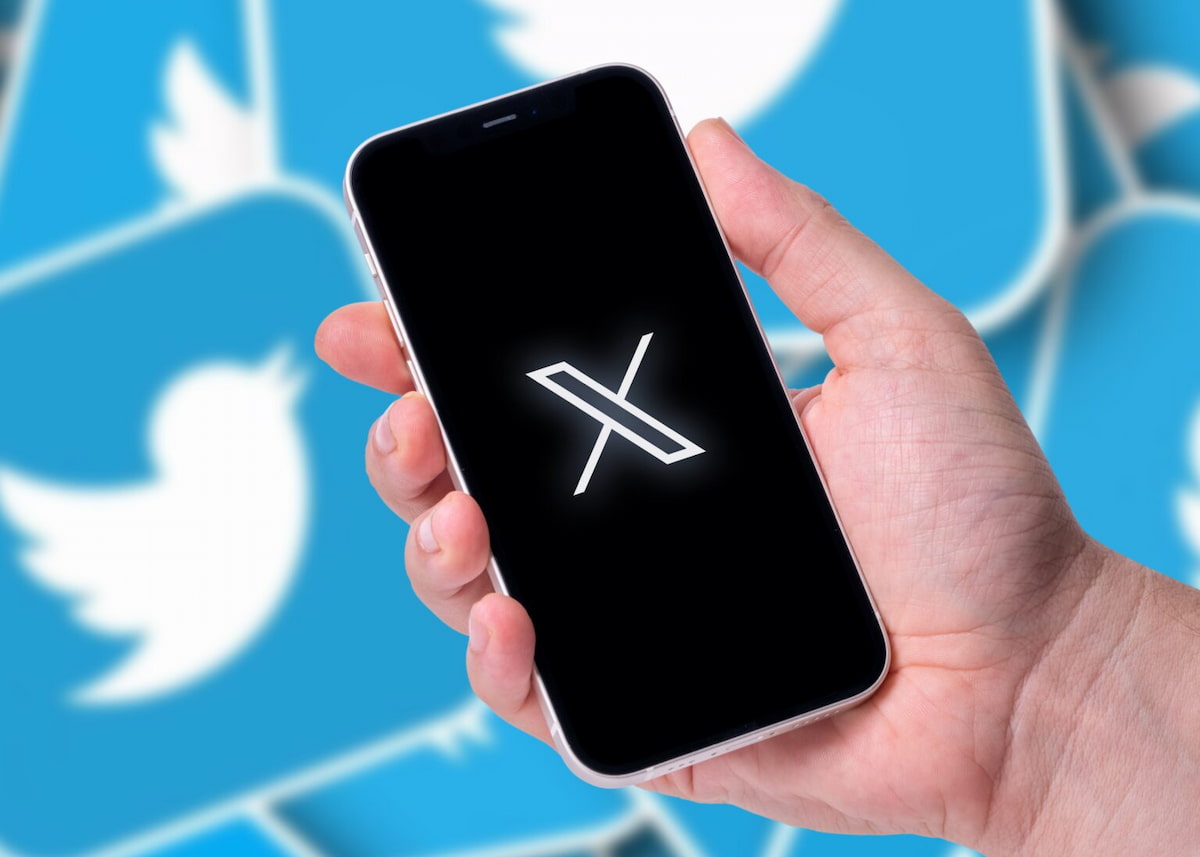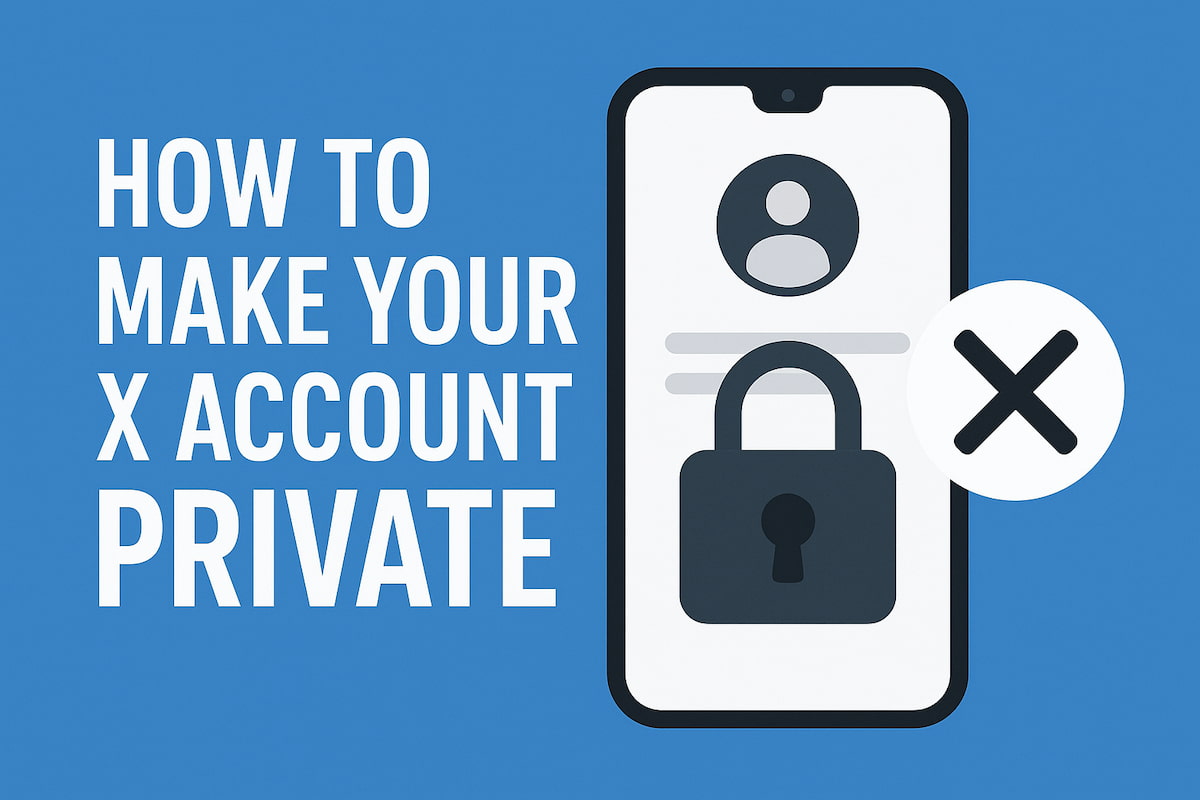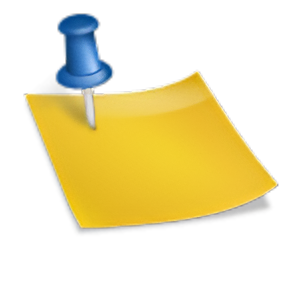Brooke Schofield, known for co-hosting the Cancelled podcast, became the subject of widespread attention in 2024 after several of her past tweets resurfaced. Many of the posts, written between 2011 and 2016, included racist jokes, slurs, and offensive comments about serious issues such as race, sexuality, and body image. After the tweets gained traction on social media, Schofield issued a public apology and acknowledged that her behavior at the time was harmful. Below are 19 of the tweets that sparked the most public reaction and led to broader discussions about accountability online.
Brooke Schofield Faced Backlash After Racist Tweets Resurfaced and Issued a Public Apology
Brooke Schofield, co-host of the Cancelled podcast, faced widespread backlash in 2024 after a series of her past racist tweets resurfaced online. The tweets, written between 2012 and 2016, were reposted by a TikTok user in July and quickly gained attention for their offensive language. They included homophobic slurs, support for Donald Trump, and a defense of George Zimmerman—the man who fatally shot Trayvon Martin in 2012.
In response to the controversy, Schofield posted a public apology on TikTok on August 4. She described her old tweets as “so disturbing” and “disgusting,” attributing her views at the time to growing up in a household dominated by “very, very right-wing conservative” beliefs and constant exposure to Fox News. “Whatever I heard, I passed on,” she admitted.
Following the resurfaced tweets, her Cancelled co-host Tana Mongeau released a new episode of the podcast on August 11, in which Schofield was absent. Mongeau clarified that the decision to exclude her co-host was hers alone and stated that she condemned the tweets. “I had no right to forgive her as a White person for the things she said,” Mongeau added, calling the tweets “horrific.”
Mongeau also acknowledged that she had initially supported Schofield’s apology but later regretted that reaction. “It’s not enough to write these things off as ‘we grew up bad,’” she said. “I hope [Brooke] takes the time to grow, to learn, and to understand the pain her words caused.”
Amid ongoing criticism, Schofield posted a follow-up video on August 6, confirming that she had donated to the Trayvon Martin Foundation and was looking into other ways to support affected communities. She stated that she was “doing [her] research” and continuing to educate herself.
As of August 2024, neither Schofield nor Mongeau commented publicly on Schofield’s long-term role in the podcast.
1. Guilty Since Childhood
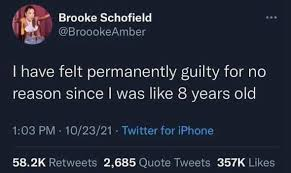
📅 October 23, 2021 – 1:03 PM
“I have felt permanently guilty for no reason since I was like 8 years old.”
A relatable expression of chronic guilt and anxiety, this tweet reflected how many people feel emotionally burdened from a young age.
2. Homophobic Language in Frustration
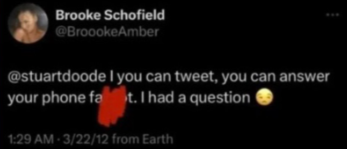
📅 March 22, 2012 – 1:29 AM
“@stuartdoode l you can tweet, you can answer your phone fa**ot. I had a question 😔”
The use of a homophobic slur—casually and publicly—is deeply offensive. There is no context in which this language is acceptable, especially when used as an insult.
3. Offensive Stereotype ‘Joke’
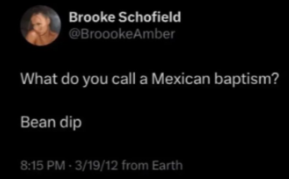
📅 March 19, 2012 – 8:15 PM
“What do you call a Mexican baptism?
Bean dip”
This tweet relies on a racist stereotype to mock Mexican culture. It dehumanizes and reduces an entire group of people to a cheap punchline based on ethnicity.
4. Trump Support Declaration

📅 November 8, 2016
“AMERICA IS GREAT AGAIN”
Posted on the night of Donald Trump’s election win, this tweet signaled political alignment that contrasted sharply with her later public image.
5. Body Image Comment During Workout Discussion
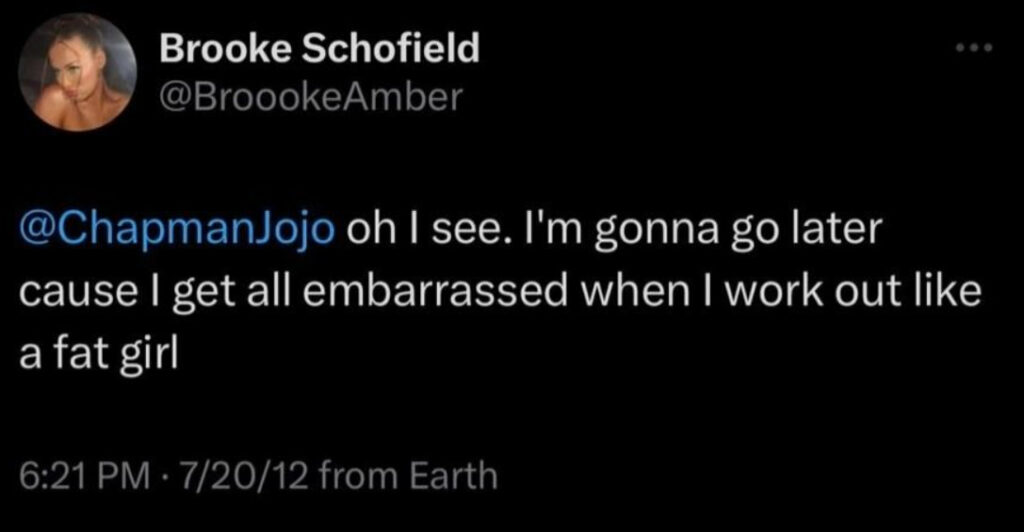
📅 July 20, 2012 – 6:21 PM
@ChapmanJojo oh I see. I’m gonna go later cause I get all embarrassed when I work out like a fat girl
This early tweet includes a body-shaming comment implying embarrassment over exercising due to weight stereotypes. It has been criticized for reinforcing negative assumptions about body image and making harmful generalizations about people based on their appearance.
6. Performative Politics in College

📅 November 30, 2016
“I started faking liberal views when writing college papers and it’s so concerning how much my grades have improved since……”
This comment was viewed as a critique of academia or political correctness, though many saw it as disingenuous or mocking.
7. Mocking President Obama with Toilet Paper
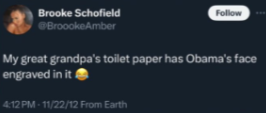
“My great grandpa’s toilet paper has Obama’s face engraved in it 😂”
📅 November 22, 2012 – 4:12 PM
This tweet disrespects the first Black president of the United States using imagery associated with racial hostility and degradation. It reinforces deep-rooted racist undertones under the guise of a joke.
8. Use of Homophobic Slur in Offensive Late-Night Post
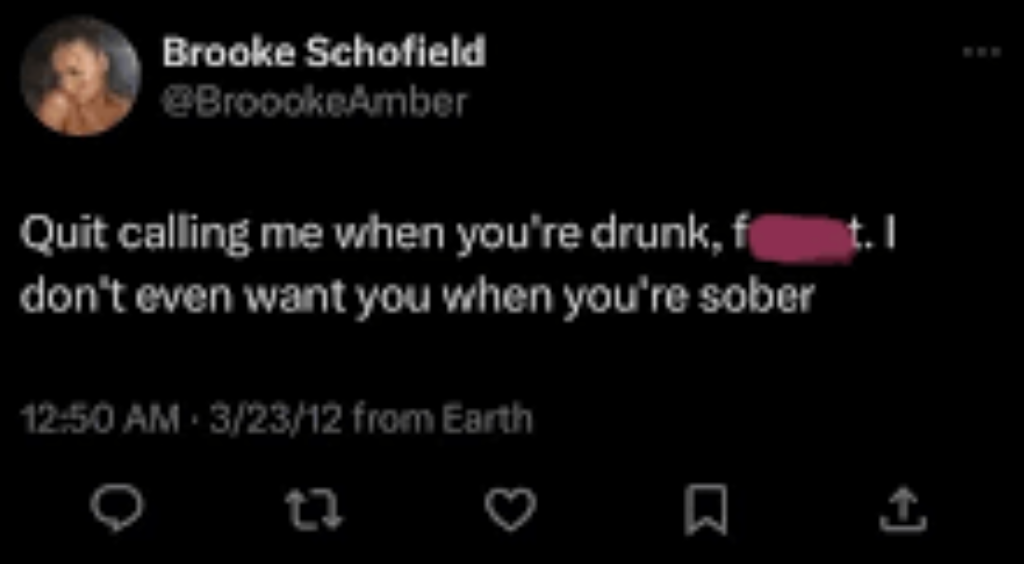
📅 March 23, 2012 – 12:50 AM
“Quit calling me when you’re drunk, f**t. I don’t even want you when you’re sober”
This tweet contains a homophobic slur used as an insult, reflecting casual bigotry and hostility toward the LGBTQ+ community. Rather than being an isolated misstep, it contributes to a culture of intolerance where derogatory language is normalized. The tweet has faced strong backlash for promoting hate speech and reinforcing harmful stereotypes.
9. Rape Joke Framed as Humor
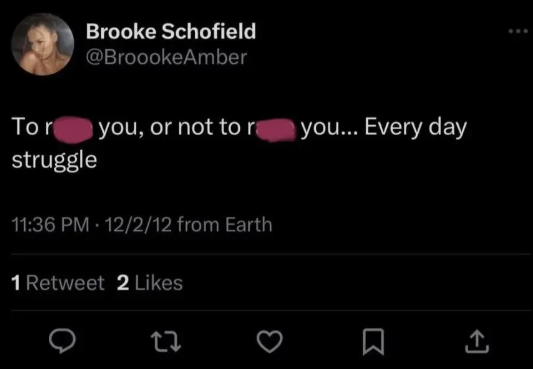
📅 December 2, 2012 – 11:36 PM
“To r** you, or not to r*** you… Every day struggle”*
This tweet references sexual violence in the form of a joke, parodying a famous Shakespeare line to trivialize rape. It was widely condemned for making light of a serious and traumatic issue, showing a complete disregard for survivors and reinforcing harmful attitudes toward consent.
10. Racist Comparison About Hair Texture
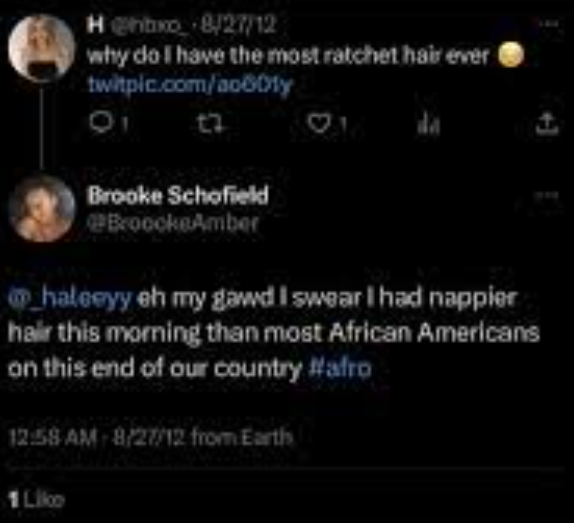
📅 August 27, 2012 – 12:58 AM
“@_haleeyy eh my gawd I swear I had nappier hair this morning than most African Americans on this end of our country #afro”
This tweet uses a racially loaded stereotype to describe hair, drawing an inappropriate comparison to African American traits. The use of the word “nappy” has a long history of being used in a derogatory way, and this post was called out for perpetuating offensive racial assumptions.
11. Fatphobic Comment Linking Body Size to Value
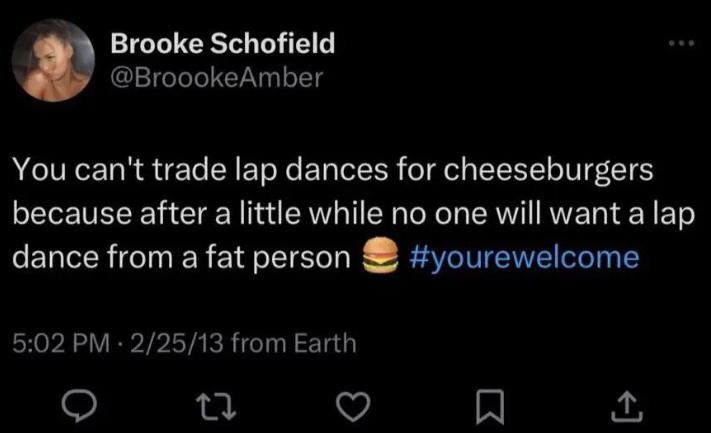
📅 February 25, 2013 – 5:02 PM
“You can’t trade lap dances for cheeseburgers because after a little while no one will want a lap dance from a fat person 🍔 #yourewelcome”
This tweet equates physical appearance and body size with personal worth and desirability. It promotes body shaming, reinforces fatphobic stereotypes, and reduces people to how they look, which has been criticized as both degrading and damaging.
12. Tweet Defending George Zimmerman
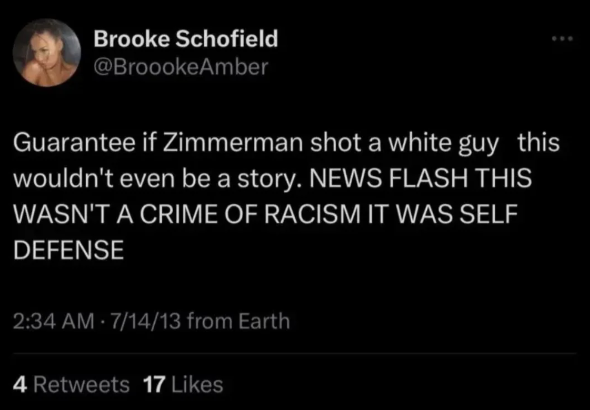
📅 July 14, 2013 – 2:34 AM
“Guarantee if Zimmerman shot a white guy this wouldn’t even be a story. NEWS FLASH THIS WASN’T A CRIME OF RACISM IT WAS SELF DEFENSE”
This tweet denies the racial dimension of the Trayvon Martin case and attempts to justify George Zimmerman’s actions. It was met with heavy criticism for minimizing the significance of racial profiling and systemic injustice in a case that sparked national protests and discussions on race.
13. Admitting to Casual Racism as a Joke
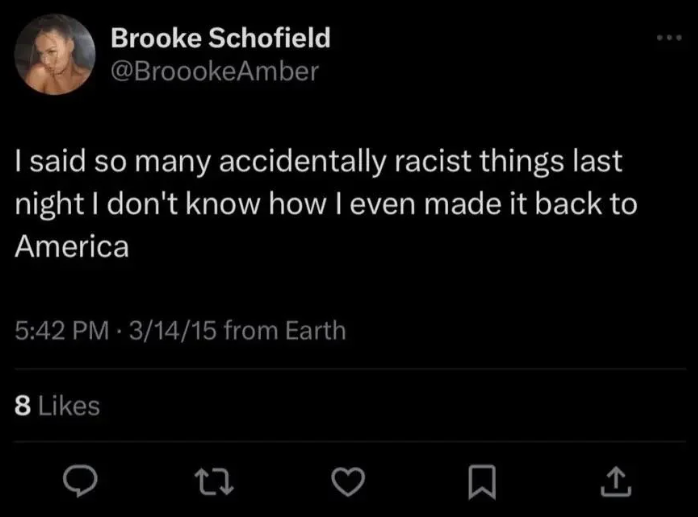
📅 March 14, 2015 – 5:42 PM
“I said so many accidentally racist things last night I don’t know how I even made it back to America”
By framing racist remarks as “accidental” and humorous, this tweet trivializes racism and implies that it can be brushed off or excused. It demonstrates a lack of understanding of the real harm caused by such comments.
14. Public Racist Incident Downplayed

📅 June 28, 2015 – 11:16 PM
“Kassie yells racist profanities in the movie theatre
Only minority in the room is sitting directly behind us”
This tweet recounts a racist incident with no expression of remorse or concern. Instead, it reads as observational and flippant, ignoring the discomfort or harm caused to the person targeted and failing to acknowledge the seriousness of the behavior.
15. Alcohol Excuse After Blacking Out
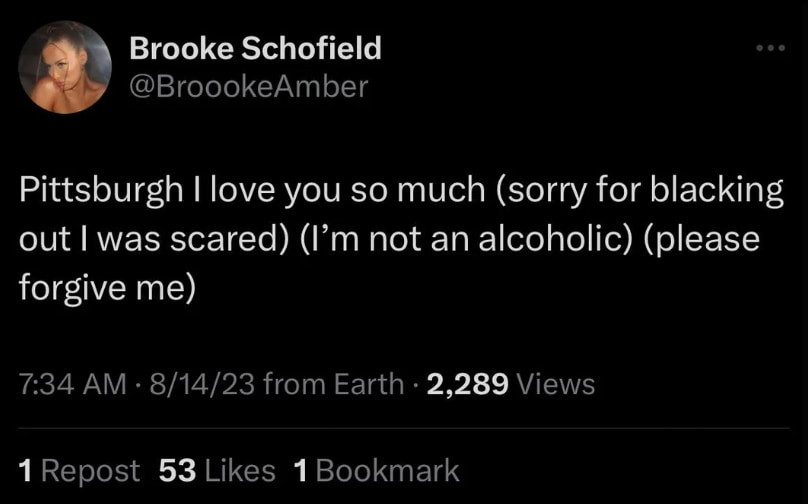
📅 August 14, 2023 – 7:34 AM
“Pittsburgh I love you so much (sorry for blacking out I was scared) (I’m not an alcoholic) (please forgive me)”
This tweet attempts to joke about blacking out from alcohol during a public appearance. While less severe than others, it drew concern for treating alcohol misuse lightly, especially in a public-facing role.
16. Public Apology Addressing Past Harm
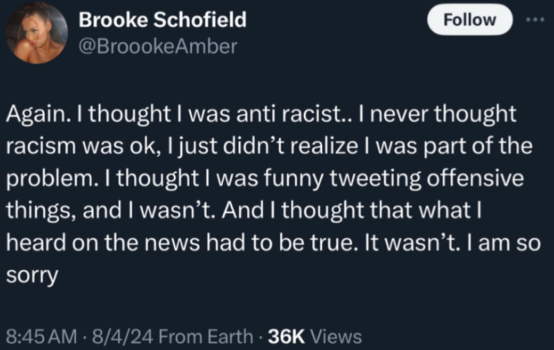
📅 August 4, 2024 – 8:45 AM
“Again. I thought I was anti racist.. I never thought racism was ok, I just didn’t realize I was part of the problem. I thought I was funny tweeting offensive things, and I wasn’t. And I thought that what I heard on the news had to be true. It wasn’t. I am so sorry”
This is Schofield’s public apology following the backlash to her resurfaced tweets. She acknowledges her ignorance, misguided attempts at humor, and complicity in spreading harmful views. The tweet represents a step toward accountability, though many have debated its sincerity and impact.
17. Offensive Use of “Ghetto” to Shame Appearance
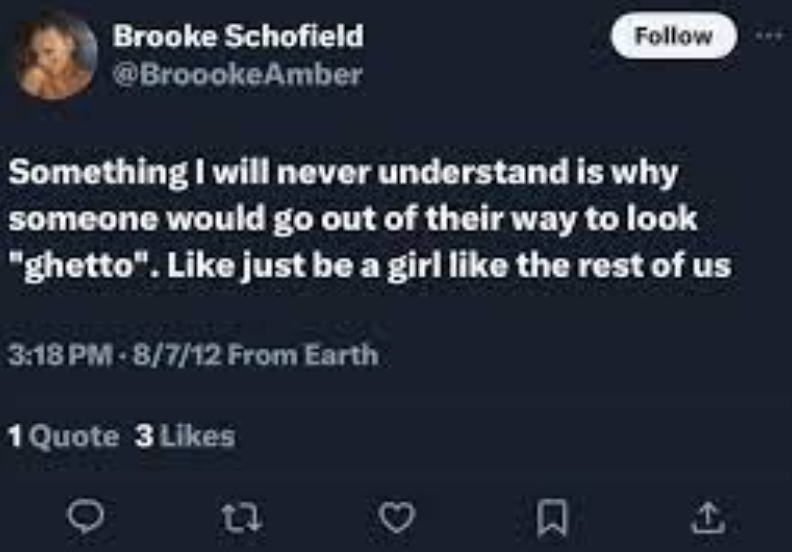
📅 August 7, 2012 – 3:18 PM
“Something I will never understand is why someone would go out of their way to look ‘ghetto’. Like just be a girl like the rest of us”
The term “ghetto” has long been used as a racialized insult to stereotype Black fashion and culture. Schofield’s tweet frames that style as undesirable and implies that looking “ghetto” is something to be shamed or rejected. It reinforces classist and racist stereotypes while promoting conformity to white beauty norms.
18. Casual Mention of “Black Jokes” as Humor
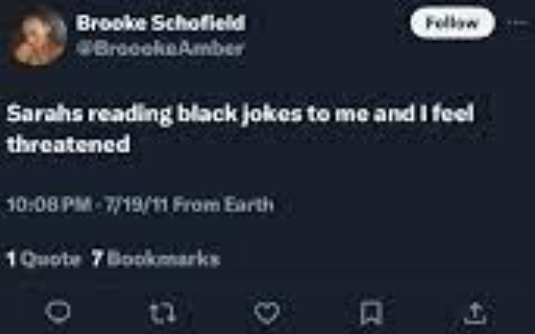
📅 July 19, 2011 – 10:08 PM
“Sarahs reading black jokes to me and I feel threatened”
Jokes targeting Black people are never harmless. This tweet trivializes the seriousness of racist humor by reducing it to a moment of awkwardness rather than addressing the offensive nature of the content. Even framing it as “feeling threatened” doesn’t take responsibility for participating in a harmful situation.
Conclusion
Brooke Schofield’s old tweets received strong criticism for including racist jokes, slurs, and inappropriate remarks about race, sexuality, and body image. These were not one-time posts but part of a repeated pattern that many considered offensive. After the tweets resurfaced, she issued a public apology and said she was trying to understand the impact of her words. The situation has led to ongoing debate about how public figures should be held accountable for past online behavior.

